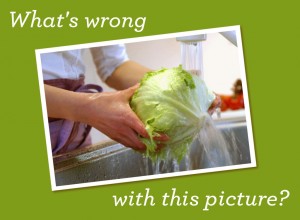Dinner Diva
How to Wash Your Fruits and Veggies
By Leanne Ely, CNC
I’m sure you’re thinking that you don’t need an article to direct you on how to do something as simple as washing your produce. But guess what? It isn’t as simple as running water over your bounty. It’s by no means rocket science, but the little steps that are just common sense, are easily forgotten and overlooked. You don’t want to take washing your produce too lightly because let’s not forget about the outbreaks of salmonella that continually highlight the evening news programs. You have to understand that if you eat your veggies raw, you don’t get rid of the pathogens you would if you cooked them. This is why you need to know how to wash them thoroughly before consumption.

What is the first thing you learn upon entering a kitchen as mama’s helper when you’re little? Wash your hands! This still applies to any cook no matter how experienced or what age. The older and more experienced you become in a kitchen the easier it is to forget the little rules. But don’t! Clean hands are where we start.
So you start out with clean hands, then we work into cleaning the aforementioned produce. Believe it or not you can use distilled or bottled water for a soak. With the harder stuff, like squashes, tomatoes, green beans and such, you’ll want to soak them for a couple minutes because that water is purified and capable of removing contaminants. And if the fruit or veggie of choice has an extra thick skin (like eggplant or cucumbers for example), invest a couple bucks in a vegetable brush, so you can scrub them. For veggies like lettuce, spinach and such, go with less time; you don’t want them waterlogged! I would also yank out the salad spinner to get rid of any extra water.
And make sure to thoroughly wash all your counters, cutting boards, knives, peelers, and any other utensils you might be using on your produce. Bacteria can easily be passed to the inside of the produce even if the outside is clean when your kitchen utensils have traces of bacteria on them. Even fruits and veggies that you’re not going to be eating the outside of (like onions and melons) need this washing treatment!
So go! Eat the fruits and vegetables you know I love so much! Just make sure you wash them well!
Now that all of your fruits and veggies are nice and clean, what are you going to do with them? How about trying out our Summer Salads or Summer Smoothies menus for a little inspiration!
2 Responses
Why do I need to use bottled, or distilled water to clean them? We have perfectly good city, tap water.
Bottlled and distilled water are two widely different types of water. Distilled water has had all minerals removed, as much as is humanly possible, and is pure water. It is often recommended for steam irons, because it leaves no mineral residue. Bottled water has minerals in it, and they can vary widely from brand to brand, depending on what is the water source for that particular brand. For example, in Europe, there is one brand of water I will not buy, because it has, to me and my husband, a rather unpleasant taste.
I don’t understand, something like salmonella or ecoli will jump off a vegetable if soaked in bottled water? As far as i know my vegetables and fruits are sprayed with chemicals, polished with waxesw and oils to make them shiny, contamined with molds from items that rotted or were bruised in transit and handled by nose picking teenagers. I need something better than this I think.